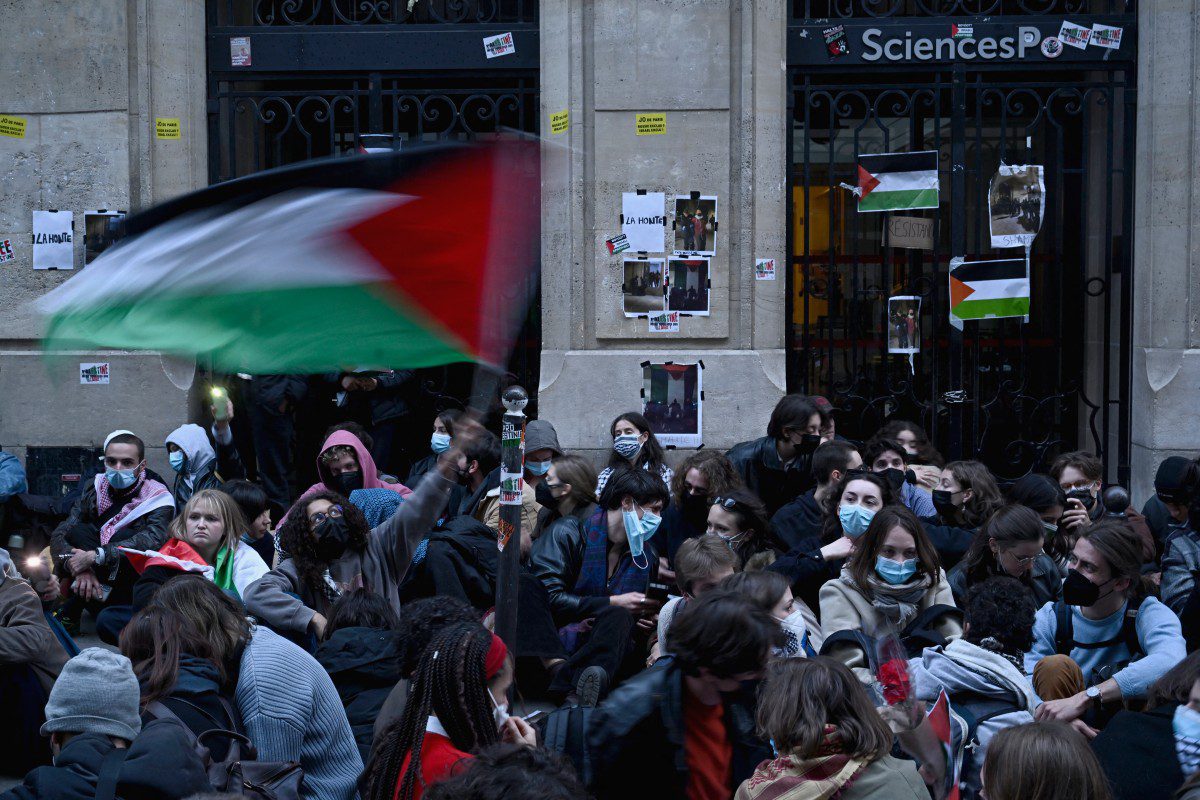
A protestor waves a Palestinian flag as they stage a sit-in in front of French riot policemen near the entrance of a Institute of Political Studies (Sciences Po Paris) building occupied by students, in Paris on April 26, 2024.
Photo by JULIEN DE ROSA / AFP
The prestigious Institut d’Études Politiques de Paris has been the scene of blockades and violent demonstrations by pro-Palestinian students for several days. To restore calm, the management gave in to the demonstrators’ demands—concessions widely denounced by a large part of public opinion and the political class, who criticize the institute’s grovelling submission to the far-Left.
Echoing the protests that have shaken American campuses in recent days, the Institut d’Études Politiques de Paris—a prestigious university known as Sciences Po—was the scene of pro-Palestinian demonstrations on site from April 24 to 26, prompting the police to intervene to restore calm. Five deputies from Jean-Luc Mélenchon’s La France Insoumise party were among the demonstrators, including French-Palestinian activist Rima Hassan, who was recently received a judicial summons for “apologia for terrorism.”
On the evening of Friday, April 26th, the demonstrators engaged in a standoff with management and put forward a number of demands. After bitter discussions, they won almost all their demands, promising to lift the blockades. The head of the institute undertook not to take any disciplinary action against the troublemakers. An internal debate is scheduled for Thursday, May 2nd, to address the issue of calling into question “the school’s partnerships with universities and organizations supporting the State of Israel”—a demand supported by the “Palestine Committee.” For the time being, the board of Sciences Po asserts that cooperation agreements cannot be called into question, but that students will be free to raise this issue during the debate on May 2nd.
Following this agreement, many voices denounced the school’s submission to the demonstrators. Former Sciences Po students, from both the Right and the Left, protested against their school’s ideological evolution, which they deemed lamentable.
Alexis Brézet, managing editor of Le Figaro, deplored the transformation of Sciences Po into a “melenchonist cretin factory”—a reference to an essay by philosopher Jean-Paul Brighelli, La Fabrique du crétin digital, which described the disastrous effects of the national education system. On the Left, Raphaël Glucksmann, head of the Socialists’ list for the forthcoming European elections, criticized the inability of pro-Palestinian demonstrators to make their point in an argumentative and constructive manner. Meanwhile, former Socialist Prime Minister Manuel Valls called for the school to be placed under trusteeship, denouncing the management’s “cowardice,” “surrender,” and “submission” in the face of “Islamo-leftism.” He analyzes the situation thus, drawing parallels with Michel Houellebecq’s speculative fiction novel Soumission:
Israel represents for wokeist ideology, complicit with Islamism, the West, the white man, guilty of colonization, apartheid, and genocide. Genocide is used as a word to disqualify and Nazify Israel.”
On the student side, support for the management’s decision to surrender to the protesters is far from unanimous. “I no longer recognize the school I joined six years ago,” reports a second-year master’s student at the law school, who—along with a dozen fellow students—wants to make another voice heard, to Le Figaro. “Six years ago, freedom of expression had its place. I had friends in the Young Communists and the Young Les Républicains (LR). Today, representative associations no longer exist. We have to keep quiet in the face of a noisy minority,” he explains. He denounces the widespread adoption of religious clothing—including the Islamic veil among a growing number of female students—and the multiplication of “bullshit” courses attended by students solely concerned with aggressive militancy.
Some professors are also worried about a contagion of ideas and behavior from the United States; they fear that Sciences Po is becoming a gateway to American excesses.
Activists are looking forward to the May 2nd debate to make their voices heard again but say that, for the moment, no further blockades are planned. For her part, MP Mathilde Panot, head of the La France Insoumise parliamentary group, says her party will support “possible new blockades.”
